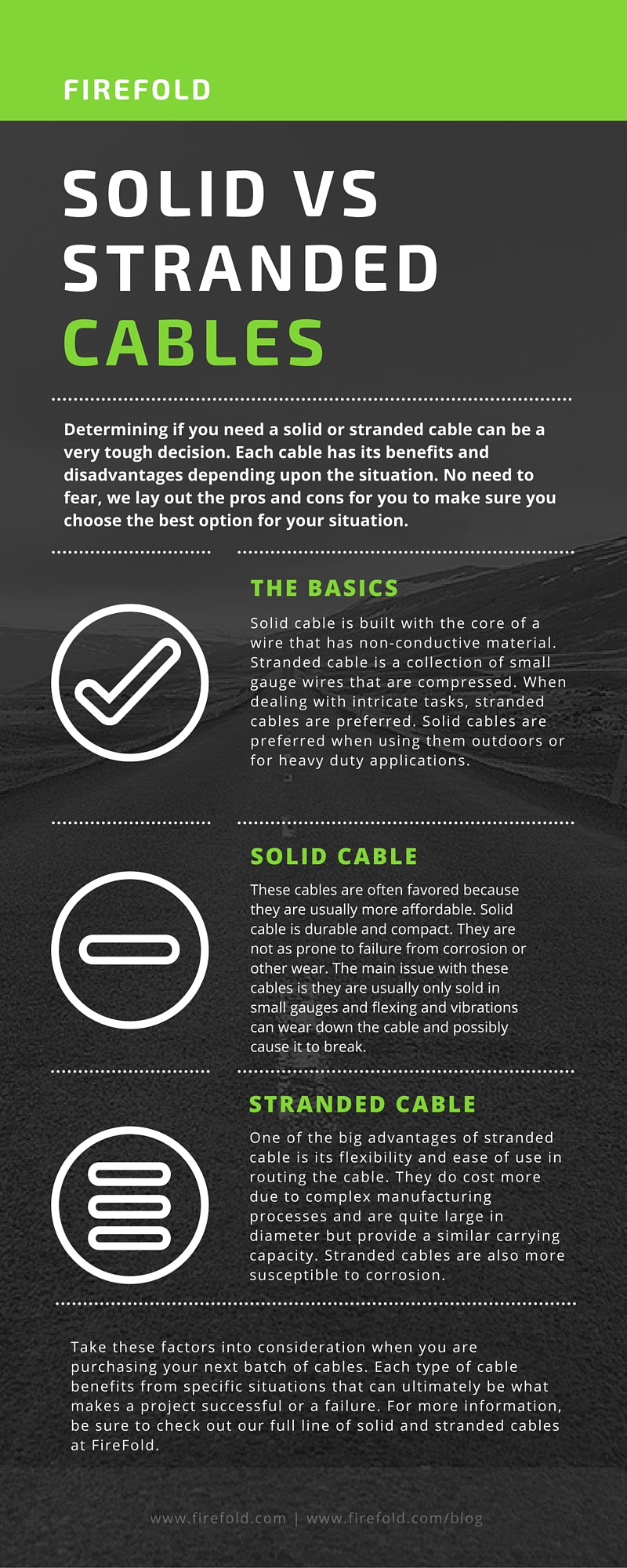
If you are on the fence as to whether you should use solid vs stranded cable, you are not alone. People all around the world struggle with this decision and there are no clear cut answers. The best option for you hinges on the nuances of your particular situation. Let's take a look at the differences between the two types of cables and examine instances where one will function better than the other.

Solid vs Stranded Cable: The Basics
Solid cable is built with one strand or the core of a wire that has non-conductive material for insulation. This type of cable is used for home electrical wiring, wiring for breadboards and other situations where wires are not required to be constantly flexed. Stranded cable is made up of a collection of small gauge wires that are insulated and compressed with materials that are non-conductive. This type of cabling is typically used in situations where wire must be routed into cramped spaces. It is also used in areas where there is considerable flexing or vibrations. Examples include speaker wire, headphone cables and appliance cables.Situations Where Stranded Cables are Ideal
Those who require cabling for intricate purposes such as circuit boards or electronic devices will favor stranded wires as they'll remain intact and protected even if twisted or bent when connecting electrical components.Situations Where Solid Cables are Ideal
Those who work outdoors or use heavy duty applications might expose the cables to corrosive particles, erratic movements and harsh weather conditions. Solid cables are best for these types of situations.The Benefits of Solid Cables
Solid cables are often favored because they usually more affordable than the stranded variety due to their cheaper production costs. These cables are simple yet quite durable. As single, thick strands of cable, they are quite resistant to threats and very easy to produce. Solid cables also have a much more compact diameter compared to stranded cables. Yet this reduced size does not reduce the current carrying ability of solid cables. Add in the fact that solid cables are not as prone to failure as a result of corrosion and it is easy to see why they are held in high regard.The Disadvantages of Solid Cables
Though solid cables have plenty of laudable characteristics, they also have a few flaws. One of the main problems with solid cables is that they are usually only sold in small gauges. Also, if there is constant flexing or vibrations, the cable could eventually wear down and break, creating the need for a replacement. Therefore, solid cables are not optimal for applications like robotics or vehicles that require a considerable amount of movement. If the cable must be bent into awkward shapes, the solid cable won't have the appropriate amount of malleability and fortitude to remain fully intact.Benefits of Stranded Cables
Stranded cables are easier to route in comparison to solid cables. They are also extremely flexible. Stranded cables can withstand an incredible amount of vibrations and flexing without fatiguing and eventually breaking. As a result, you won't have to replace your stranded cables as often as will be necessary with solid cables.Disadvantages of Stranded Cables
Stranded cables are far from perfect. Their diameter is quite large yet they provide a similar carrying capacity as solid cables. They are also more expensive as their production costs are considerably higher than solid cables. These costs are higher due to the complex manufacturing process that is required to develop these intricate wires. Also, stranded cables are much more likely to falter as a result of corrosion from capillary action. It is also worth noting that stranded cables are not ideal for preventing electronic interference as the air channels in between each strand amplify the “skin effect” created by the magnetic fields along the cable's surface. Be sure to take each of the factors listed above into account before making a commitment to either solid vs stranded cable for your home or business project.


